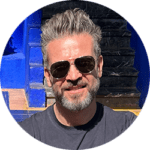 Thomas Boué – Director General, Policy – EMEA
Thomas Boué – Director General, Policy – EMEA
I am originally from Lens, France, but have lived in Brussels for over 20 years.
In May 2009, after spending almost five years in a Brussels Public Affairs consultancy advising and lobbying for technology and telecoms clients on EU policies and running a coalition of the reprographic industry, I decided to join BSA. I was excited to take on a new challenge, delve deeper into software and cloud issues, and join an organization with a truly global reach.
I cannot believe this was 15 years ago! Today, I am as enthused as I was on my first day, and I think I am the longest-serving member of BSA’s Global Policy team.
I have a law degree from the Universities of Lille II (France); a trilingual master’s in European law from the Universities of Lille II, The University of Warwick (United Kingdom), and Universität des Saarlandes (Germany); as well as a Master of Business Administration from the Europa-Institut (Germany).
What’s the most unique part about working at BSA?
There are two things that make BSA a unique place to work.
First, the issues we work on: We are driving the policy discussions on cutting-edge issues at the core of our members’ business interests. Those evolve over time, and as a result, I feel as though I’ve had six or seven different careers while at BSA, and there is never a dull moment. I spent a great deal of time on intellectual property, then switched to privacy, cybersecurity, artificial intelligence, and the list keeps growing.
Second, the people: My colleagues in EMEA and around the world all share similar values of excellence, collaboration, dedication, and humanism. I cherish this really unique work environment.
What’s the most helpful thing you’ve learned working at BSA?
As the head of the Brussels office, having to recruit people to strengthen the team, I’ve learned that what matters most when interviewing and hiring is to focus on attributes rather than specific expertise. One can teach anyone almost anything of substance (and let’s face it, we don’t deal with nuclear fission here). You can’t, however, teach curiosity, an eagerness to learn, motivation, or enthusiasm. A person either has these attributes, or they don’t.
What’s one piece of career advice you are still trying to master?
Letting go. When I began managing a larger team, and as the list of our issues grew, my mentor – Emery Simon – advised me to stop trying to get involved with everything and trying to have a handle on all the nitty-gritty details.
Instead, Emery advised me to be sufficiently knowledgeable and able to engage and represent our views and interests accurately in any situation. That’s still something that I remind myself of every day.
Tell us one fun fact about you (that might surprise your colleagues).
I am a classically trained musician. Until my early 20s, I played violin in a symphonic orchestra (dressed in a tux and bow tie), was the bassist and singer of a pretty brutal metal band, and had a stint as a saxophone player in a jazz band.
Favorite book/podcast/long-form article you recommend? What did you learn?
I wouldn’t say favorite, but “Patriotism,” by Yukio Mishima, and “Essays,” by Michel de Montaigne, are always at the back of my mind. “Patriotism” for the ideals of honor, love, and responsibility that it conveys, as futile as they may appear. “Essays” for its reflections on one’s nature and how to best deal with the complexities of life.
I often reflect on this quote from “Essays”: “The value of life lies not in the length of days but in the use you make of them; he has lived for a long time who has little lived. Whether you have lived enough depends not on the number of your years but on your will.”
If you could have dinner with any historical figure, who would it be and why?
That would definitely be Mahatma Gandhi. I have always admired his determination, wisdom, serenity, and grace in fighting injustice in a firm but calm, peaceful, and respectful manner.



Nice to know a bit more about you, Thomas!